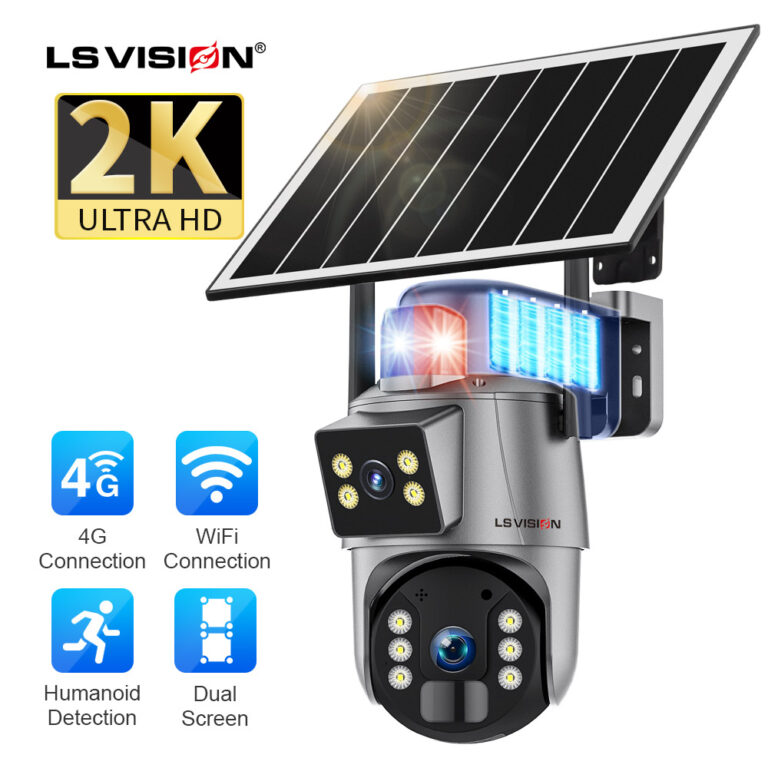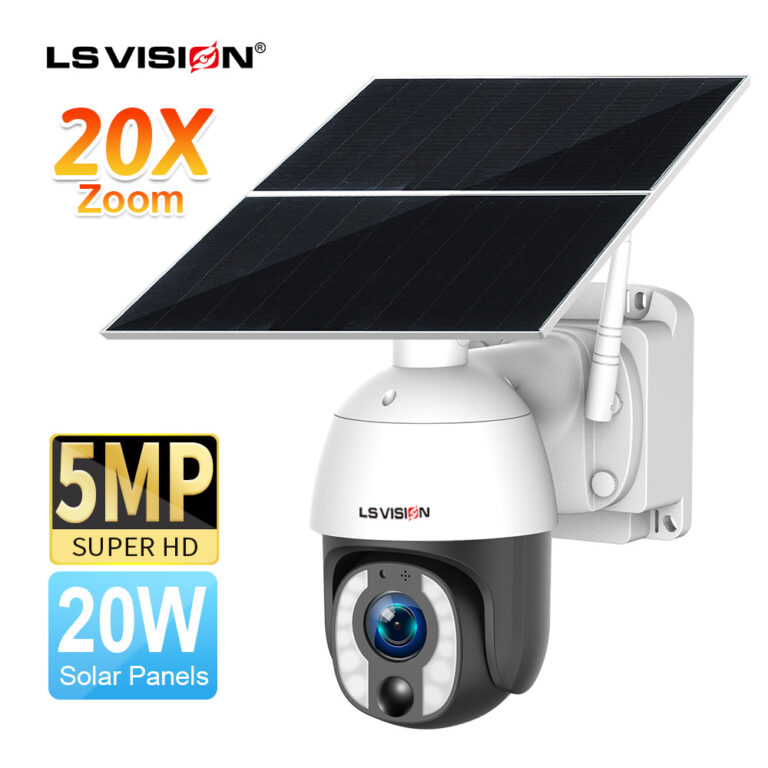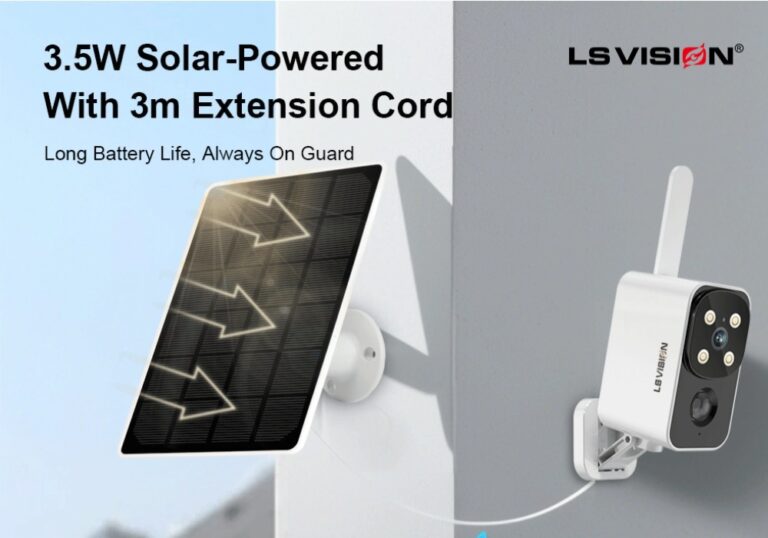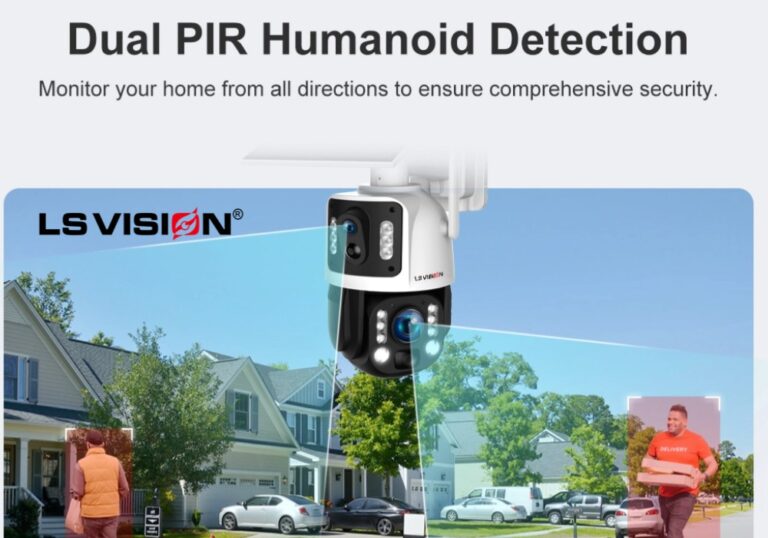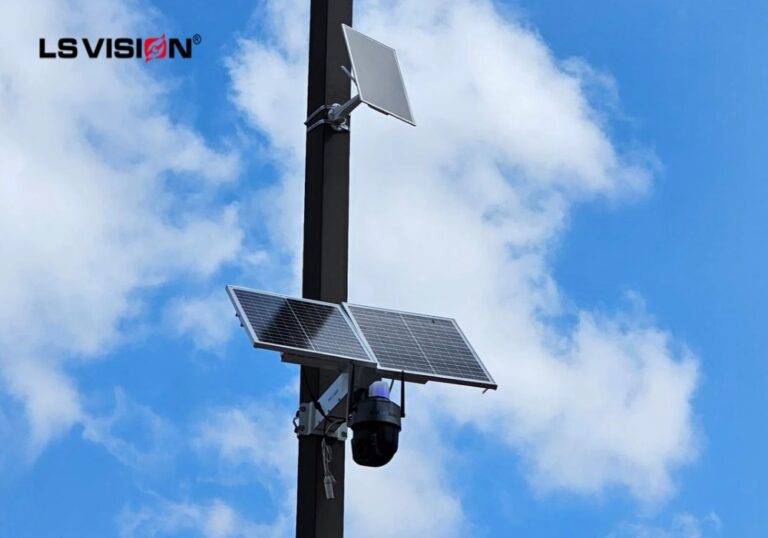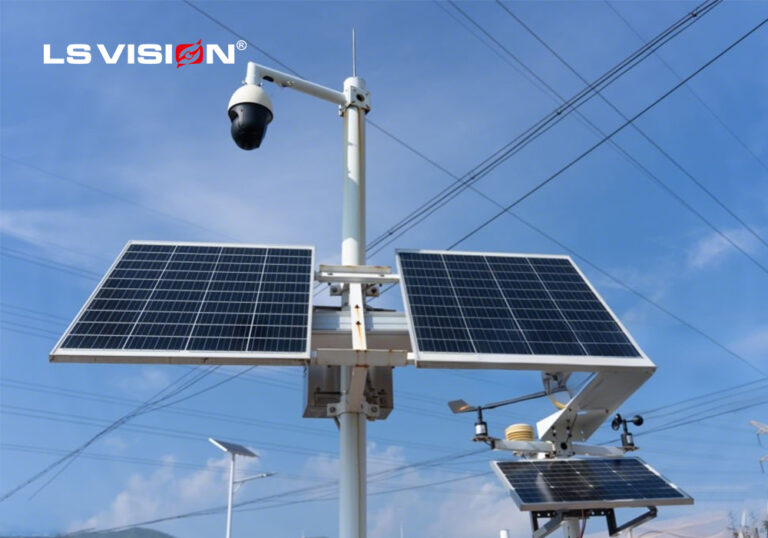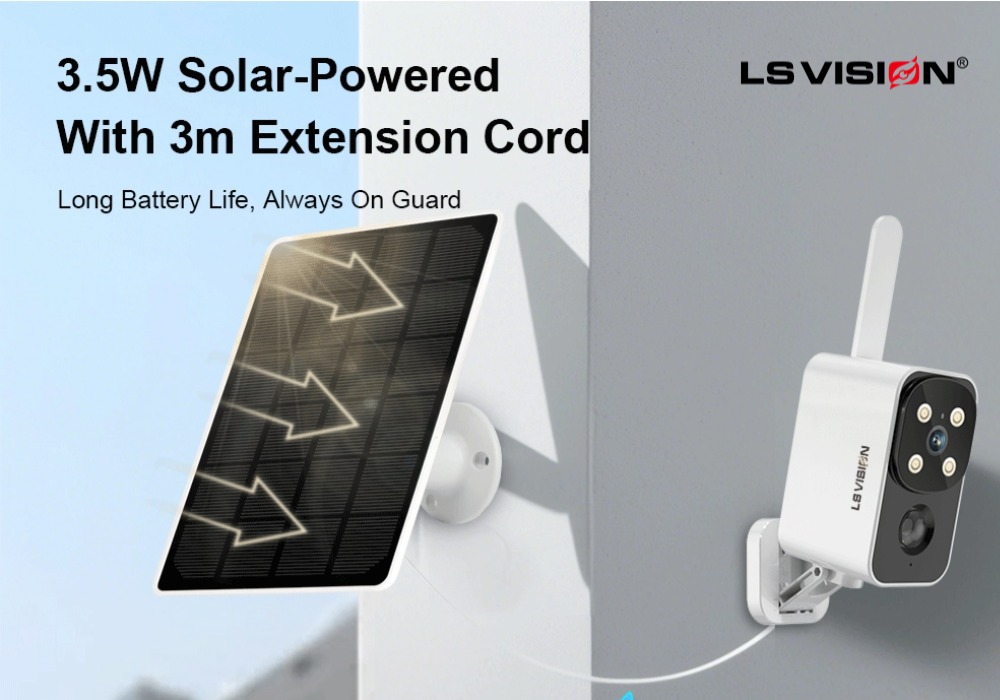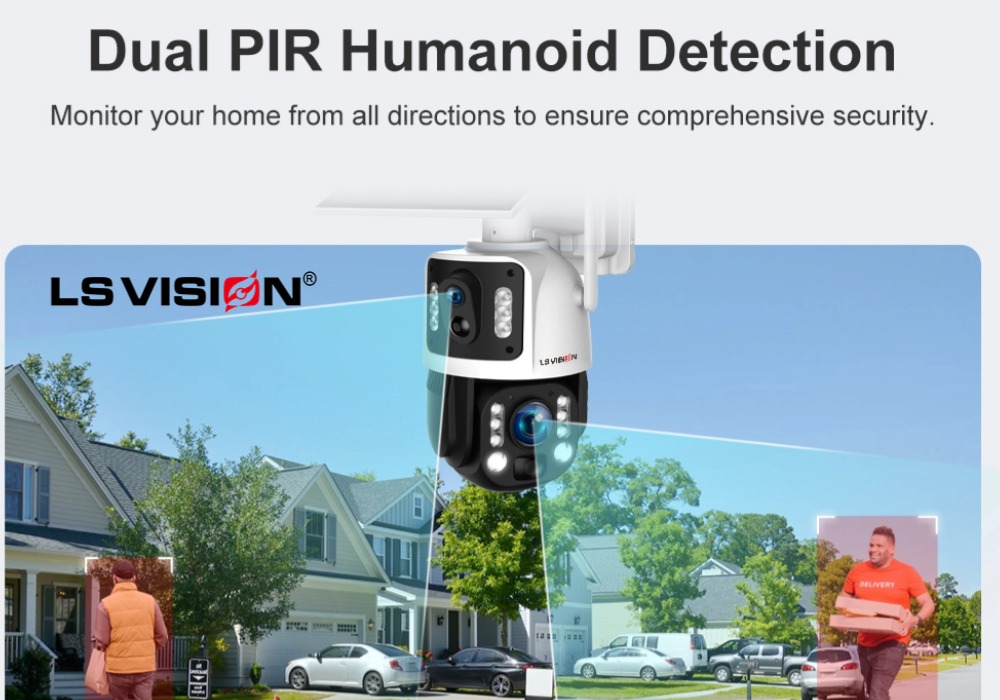When securing large-scale projects such as construction sites, warehouses, or expansive facilities, selecting the right camera system is essential. The decision typically comes down to two main options: solar-powered cameras or traditional wired cameras. Understanding the costs, benefits, and limitations of each system will help you make the best choice for your specific needs. In this blog, we’ll break down the key differences between these two types of systems, giving you the insight to make an informed decision for your large-scale project.
Initial Costs: Comparing Solar and Wired Camera Systems
Solarbetriebene Kameras
Solar-powered cameras typically come with a higher upfront cost compared to wired systems. This is because, in addition to the camera unit itself, you’ll need to invest in solar panels, batteries, and possibly specialized charging equipment. However, these costs are quickly offset by the significant energy savings over time. By relying on solar energy, solar-powered systems eliminate the need for electricity bills, providing cost relief for large-scale projects in the long term.
For example, LS VISION offers the Dual Lens Dual Screen 36X PTZ Solar Camera, which is ideal for large-scale projects. It includes everything needed for efficient, long-term operation. Though the initial cost is higher, it will save money on wiring and electricity, especially in remote locations where access to electricity is limited.
Wired Cameras
Wired camera systems typically have a lower initial cost. However, their installation can be expensive, especially for large projects with extensive wiring requirements. Wiring, connectors, and the need for a power source for each camera all contribute to the overall installation expense.
While wired cameras don’t rely on solar power or batteries, they do require a constant electricity supply, resulting in ongoing costs. For large-scale projects with numerous cameras or long-term surveillance needs, these operational costs can add up, making wired systems more expensive in the long run compared to solar-powered cameras.

Installation and Maintenance: The Pros and Cons of Each System
Solarbetriebene Kameras
One of the major benefits of solar-powered cameras is their ease of installation. Because they don’t require external power sources, you don’t need to worry about running cables or connecting to the grid. This makes them ideal for large projects, especially in remote or off-grid locations where traditional wiring would be expensive or difficult. Additionally, installation is quick and minimally disruptive to your site.
Maintenance for solar-powered cameras generally involves ensuring the solar panels are kept clean and monitoring the performance of the batteries, which may need to be replaced after a few years. However, because these systems don’t rely on continuous wiring or electricity, they require much less ongoing maintenance than wired systems. For example, LS VISION’s Dual Lens Dual Screen 36X PTZ Solar Camera comes with features like intelligent motion detection and built-in infrared and white light, reducing the need for frequent manual adjustments.
Wired Cameras
Installing wired cameras is more complex and time-consuming. Running cables throughout your project site requires professional installation and can add significant costs, especially if the area is large or if cameras need to be placed in hard-to-reach locations. Furthermore, installation can be disruptive to ongoing activities.
Maintenance of wired systems requires regular checks on cables and connectors. If any cables become damaged or connections are loose, it can disrupt the entire system, leading to expensive repairs. Additionally, these systems must be checked periodically to ensure the power supply remains stable, adding another layer of maintenance.
Operational Costs: Understanding Long-Term Energy Use
Solarbetriebene Kameras
Once solar-powered cameras are installed, their operational costs are very low. Since they rely on solar energy, there are no electricity bills to worry about. The only ongoing costs are related to maintenance, such as replacing batteries and cleaning solar panels. For large projects with many cameras, this can lead to significant cost savings over time, especially in areas where grid power is unavailable.
The Best outdoor wireless solar-powered security camera system is particularly advantageous for large-scale projects, such as construction sites or farms, where electricity may be limited. Not only are these systems cost-effective, but they also have the added benefit of being environmentally friendly as they rely on renewable energy.
Wired Cameras
In contrast, wired cameras rely on grid electricity to operate. This means they incur ongoing electricity costs, which can add up, especially for large projects with multiple cameras running 24/7. The energy costs will vary based on the number of cameras and their usage, but for larger sites, these costs can become substantial. Additionally, maintenance costs for wired systems are typically higher, as they require regular inspections to ensure that cables and power supplies remain in good condition.
For large-scale operations, the cost of powering a wired camera system can quickly outweigh the initial savings, making it a less cost-effective option over time.

Performance Considerations: Consistency and Reliability
Solarbetriebene Kameras
While solar-powered cameras offer great performance, their efficiency can be affected by weather conditions. Extended cloudy periods or poor weather can reduce the amount of solar power generated, which can impact the camera’s operation. However, modern solar-powered systems, like LS VISION’s solar cameras, come with batteries to store excess energy, ensuring the cameras continue to operate even on cloudy days. Additionally, advanced night vision technology allows solar-powered cameras to provide clear surveillance at all hours, further enhancing reliability.
Wired Cameras
Wired cameras offer more consistent performance since they are directly powered by the grid. This means they are not affected by weather conditions and will provide reliable video surveillance around the clock. The only drawback is that if the power supply is interrupted for any reason, the entire system can go down. This makes solar-powered systems with battery backups a more resilient option, especially in areas where power outages are more common.
Pros and Cons of Solar-Powered Cameras
Pros:
Eco-Friendly: Solar-powered cameras use renewable energy, which helps businesses reduce their carbon footprint.
Flexible Installation: These cameras can be installed almost anywhere, even in remote areas without electricity.
Lower Long-Term Costs: After the initial investment, there are no electricity bills, leading to significant savings in the long run.
Reduced Maintenance: Less maintenance is needed compared to wired systems, as there are no cables to manage or power connections to check regularly.
Cons:
Higher Initial Costs: The upfront cost for solar-powered systems is typically higher due to the need for solar panels and batteries.
Performance Affected by Weather: Efficiency can be reduced during extended cloudy periods or poor weather.
Battery Maintenance: Batteries may need to be replaced after a few years, which can incur additional costs.
Pros and Cons of Wired Cameras
Pros:
Reliable Power Supply: As long as there is access to grid power, wired cameras provide consistent surveillance without interruptions.
Stable Performance: These systems provide high-quality, uninterrupted video, unaffected by weather conditions.
Scalable: Wired systems are easy to expand, making them a great choice for projects with already established power infrastructure.
No Battery Maintenance: Unlike solar-powered cameras, wired cameras don’t rely on batteries that need to be replaced periodically.
Cons:
Higher Operational Costs: Ongoing electricity usage leads to higher costs over time, especially for large projects.
Complex Installation: Requires professional installation and extensive cabling, which can add significant costs and installation time.
Vulnerability to Power Interruptions: If the electricity supply is interrupted, the entire system may go down.

When deciding between solar-powered cameras and wired cameras, it’s important to evaluate the specific needs of your project. If you’re working in a remote location or want to minimize ongoing operational costs, solar-powered cameras are the best choice. These systems are cost-effective, environmentally friendly, and flexible, making them ideal for projects with limited access to electricity.
On the other hand, if your project has reliable access to electricity and you need consistent, high-quality performance, wired cameras may be more suitable. They provide uninterrupted power and video quality, but the higher installation and ongoing electricity costs should be considered.
iCSee metallic PTZ ball
80W Solar panel support 24/7 hours recording
4G and wifi for option
Onvif support NVR
PIR+humanoid detection
Wasserdicht nach IP66
Schlussfolgerung
Choosing between solar-powered cameras and wired cameras ultimately comes down to the specific needs of your project. Solar-powered cameras offer long-term savings, flexibility, and environmental benefits, making them ideal for remote locations or sites where grid power is not available. Wired cameras, while offering stable performance, come with higher ongoing costs due to electricity usage and maintenance needs.
If you want a cost-effective, reliable, and sustainable solution, LS VISION’s solar-powered cameras, like the Dual Lens Dual Screen 36X PTZ Solar Camera, are a smart choice for your large-scale project.
To learn more about our products or to get in touch with us, contact LS VISION via email at sales@lsvisionsolar.com or call us at +86 13544211486. Let us help you find the best security solution for your large-scale project!

